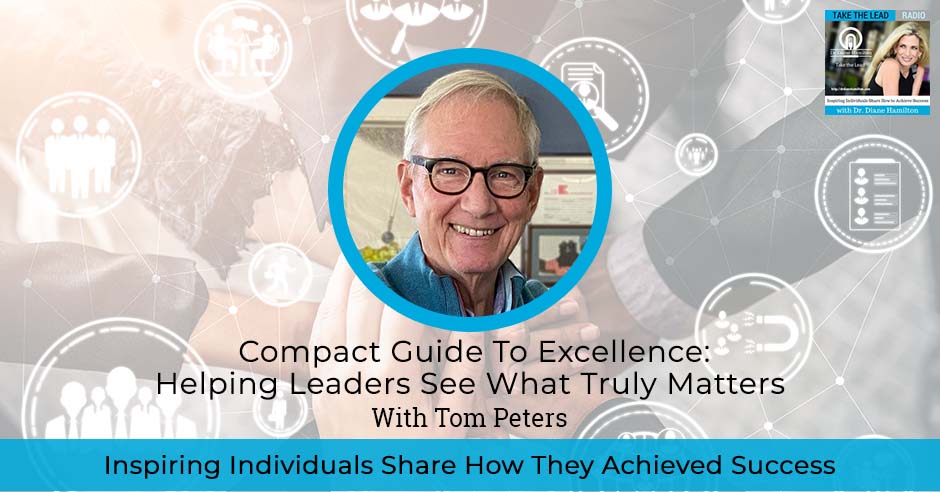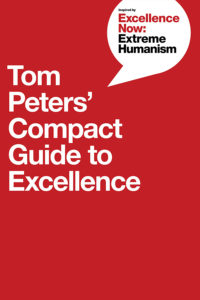Tom Peters illuminates this episode with his wisdom by sharing his new book, which was inspired by Excellence Now: Extreme Humanism. Tom, the co-author of Compact Guide to Excellence, shares the guidebook for leaders in the workplace to urge them on what truly matters at work. He gathered all these gems of wisdom over the years, and with the help of Nancye Green, they made the most accessible and captivating way to put out all these insights. Execution is among the 13 topics inside the book, which Tom shares for everyone to relish. If you want to learn more, tune in to this episode now!
I am here with Tom Peters, who is the coauthor of In Search of Excellence, the book that changed the way the world does business and is often known as the best business book ever. He has a new book that’s sure to be another on his long list of bestsellers titled Compact Guide to Excellence, which was inspired by Excellence Now: Extreme Humanism, which was the last book we chatted about when Tom was on my show in the past. We had a blast. As I recall, we bonded over our love of Monty Python. Some of the things we talked about are Project Oxygen, Project Aristotle, and how Susan called him an idiot. If you want to find that, it’s on the last show. That was quite an interesting episode. I’m excited. It’s nice to have you here, Tom.
Watch the episode here
Listen to the podcast here
Compact Guide To Excellence: Helping Leaders See What Truly Matters With Tom Peters
I was told that John Cleese is coming and he’s going to be the third person.
I hope so. I would love that.
We both would.
We could all do silly walks together.
You and I could shut our mouths and let him do a monologue for the next 45 minutes.
I’m a huge Cleese fan. You and I could chat all day about our commonalities of the things we love. I’m interested in talking about your new book because your books are always amazing. You have been known for being at the top of the list always. I’m curious, what would make you want to write a book more about quotes for your audience?
If you looked at the spine, you would see Tom Peters and Nancye Green. Nancye is on all of the lists as one of the top 100 designers in the world. She was Chairwoman of the Board of Parsons Trustees, The New School, etc. She’s amazing. Donovan/Green, her company, did the design of the last book, the Extreme Humanism book. She and I were talking about it and we said, “After Tom Peters, author of Liberation Management, 900 pages long, let’s see if we could do something essential and compact.” The product is way undersized.
Moreover, relative to what you said, the way it’s laid out is we have thirteen topics, and the first one is execution. The first two pages you see are those, and this is typical of the book. On the left side, it says, “Amateurs talk about strategy.” On the right side, it has a quote from Peter Drucker, “Strategy is a commodity. Execution is an art.” After that, it has a quote from a Marine Corps general, “Amateurs talk about strategy, professionals talk about logistics,” which are two terrific quotes. The point is to whack you over the head with those, normally I would write 500 explanatory words. You don’t need 500 words for that. If you and I were in a certain position, we could have a day-long discussion over those two lines. It is compact. It’s an effort to be the essentials, whatever the hell it is I’m doing. I’ve done it for many years.
[bctt tweet=”“Strategy is a commodity. Execution is an art.” – Peter Drucker” username=””]This is a different kind of effort. I’ve never loved the book that I wrote. It’s okay for me to say that because it’s Nancye who did the things that made me love it. Incidentally, she was the one who came up with the term extreme humanism in the last book. I had been talking about humanistic and she said, “That’s manipulative. Let’s do extreme humanism.” After all these years, I’m calling it the next step after excellence. Given all the stuff that’s going on, going down around, you and I, a little humanism wouldn’t hurt. I believe that in businesses of size 6 or 6,000, you can make an enormous difference relative to social unrest going on around us if you can turn your workforce into a growing, excited group of people. Pissed-off people get involved in extremist situations. People who are happy at work, learning at work, and growing at work, I don’t have the research, but I bet you the odds go way down.
The research I did for my work and my books is all about curiosity and perception. We saw a lot that ties into the engagement, and so much more when people are aligned well and all that. A lot of it is letting them explore opportunities, and curiosity is a huge part of that. I’m part of the Thinkers50 Radar. I saw that the cofounder, Stuart Crainer, wrote an interesting write-up for your book. I loved it. It said, “Tom repeats himself. He curses. He shouts. Why? Because his message is so important.”
God bless you, Stuart. We’ve been together for a lifetime. He wrote a biography, believe it or not. I love the guy. Thinkers50 was a weird deal. Have you been?
Yeah.
Did I meet you there?
No. I was there the year before COVID.
2017 was the year when I got some kind of award. The nicest thing about the award was not the award. It was when I was introduced by Charles Handy. To me, Charles Handy and God are used in the same sentence. The Thinkers50 is doing a terrific job. Des Dearlove is his second in command. I’m starting a paper right now. I started it with a teacher standing at the door to her or his classroom as the class begins. There are seventeen kids in the classroom. As each one comes in or as Diane comes in, I do a little smile and say, “Good morning. Cool to see you again.” I do that seventeen times. It’s probably not personalized because the whole thing doesn’t take more than five minutes. That’s all I do.
This is measured by such hard-nosed things that you wouldn’t believe it. Disciplinary problems go down by 20%. Academic engagement goes up by 20%. It’s just from being a human being and looking you in the eye. I change your entire world by acknowledging that you’re here, you’re alive, you’ve come to the classroom, and I’m happy to have you here. I love that experiment because it’s not that it says it’s easy, which it is, but what it says is these are the elements, caring, kindness, thoughtfulness and engagement. That’s my real hobby horse these days. I love that experiment because it’s trivial and powerful.

Compact Guide To Excellence: Disciplinary problems go down by 20%. Academic engagement goes up by 20%.
People want to feel connected. I wrote my dissertation on emotional intelligence, and I loved having Daniel Goleman on the show. We talked about all of these things. You’re dealing with so many of these same things. I’m interested in how we can teach people to be more empathetic. If we’ve already hired them and we’re not hiring empathetic people, then they need help. Do you think that inspirational books like this that compact content into bite-size pieces are part of the solution?
No, I’m not that arrogant. First of all, Diane and your company, I want you to hire for EQ. I’ve got a quote. I don’t think it made it to the compact guide. I can’t remember the guy’s name, but he heads an excellent biotech firm. The quote is, “We only hire nice people.” He says, which is what I love, “Tom, you couldn’t even understand the name of the degrees that some of these people have in biotech, but I figured something out. Even in something obscure like that, there are a lot of people. Hire the nice ones.”
The deal is you’re the CEO and I’m the person who’s applying. We have a good interview. He says, “Bye. I’ve got a couple of things for you to do.” I am required to run the gauntlet and talk to six people for about ten minutes each, finance department, purchasing department, R&D, wherever. Each of those six people has a veto right on my employment. What he said, which is what you and I are saying, is that the point of all this is one un-nice person in a mono-size company can screw up the entire culture.
[bctt tweet=”The point of all this is one un-nice person in a mono-size company and screw up the entire culture.” username=””]I’m wobbling around the question. I believe you should hire for EQ exclusively, but perhaps you haven’t. There is one place, madam, where I will not cut you one bit of slack, and that is promoting EQ. I could scream it. I was in the Navy. I know how to cuss. I could use every cuss word that I learned, hire and promote for EQ. It’s still not 100%. I’m not that way about my books. I said to somebody one time, “If Tony Robbins walks into a room with 1,000 people, he expects to change 1,000 lives. If I walk into a room with 1,000 people and two people walk out of the room and say, ‘I’m going to do things differently,’ I got a great day.” That’s not a throwaway of mine. It’s true.
What I’m hoping is not so much that it would be useful for anybody, but I’d love to see around the table in our 60-person company a group of nine managers using the book as a discussion guide. Every one of those quotes could be blown up into an hour discussion. That’s my hope. You’re the expert. You wrote about it. In terms of changing EQ, if I create a fabulous work environment, I can suck a little EQ out of everybody. Where I won’t give an inch, and you tell me whether I’m an idiot, is I won’t give an inch on the six candidates that we have to replace the guy, not in the fashion good store in the service department of the automobile dealership. It’s more important there than it is at Nordstrom.
You know that people leave bosses more than they leave companies. I totally agree with what you’re saying. It’s interesting because I interview CHROs, the head of HR, for the largest companies out there. Huge companies are on the show for the other show I do at Global Mentor Network. I keep hearing about all the employees coming in and they tell you what they want for the job more than what the company can tell you because supply and demand have changed. Everybody is fighting for these people. The people say, “If you don’t offer me this and this, I can go over here and get it.” It’s a different time than when you wrote In Search of Excellence. We have younger generations. How are you going to get that same traction? Your book was the bible for my generation. Now you’ve got different ways of thinking.
Yes and no. I’m sorry to say that I have not read your dissertation, but I bet if I read 200 pages of yours on the topic of EQ, there’s nothing fundamental that you’re writing about that has changed. I know the hiring shortages. When I’m deciding to hire, I’m going down to the local Shaw’s grocery store and I’m going to stand behind a checkout clerk. I’m going to watch 50 people go by. Ten of them are pissed off about something in life or what have you. Ten of them are nonchalant, and ten of them say, “Martha, it’s good to see you.” I don’t think anything has changed. Of course, I do. I’m not an idiot.
I also am arrogant enough to think that when you and I start our nine-person company and create an attractive, caring, thoughtful, and fun workplace, I don’t think we’re going to have a hell of a lot of problems finding employees. You will never talk me out of that position. I think that’s as true for Dunkin’ Donuts as it is for the brilliant Tom and Diane starting their company. You give me a Dunkin’ Donuts with a fabulous manager and I will give you a place where there’s a line of people applying for jobs. I’m willing to be called an idiot or anything else but that’s my deal.
I have to agree. We always talk about the value of culture. It was interesting because of this big board summit. No matter if you got into the finance group or if you got into the environment group or you got into the culture group, everybody is talking about culture. It keeps coming back to culture. You and I are on Twitter together. I see your quotes and people follow your tweet and everything everywhere. I love to watch what you post because you don’t mind a little bit of drama and people saying nasty things. When I post a motivational quote compared to when I post something else, it gets picked up so much more. I’m curious, do you think the days of long chapters and long wording in different aspects are gone? Are we going to want sound bites and smaller amounts?
I don’t know. I might have answered it differently. I read an article somewhere that said libraries are doing fine. That doesn’t answer your entire question. As is true with my last two books, I do strongly believe that shorter is better. Maybe not in the science part obviously of biotech or whatever it is. I’ll give you two answers. One of them is I quit and run off the screen. I read that TikTok has 100 million American users who use it on average six hours a day. I don’t know how to write a book for those people. I’m sorry. I’m also willing to say, “Maybe, Tom, that’s the new world. You figure out how to engage in that setting,” which is true to some extent.
I have had Dr. Gilda Carle on my show. She used to be on Sally Jessy Raphael. She’s the spinoff of the way Dr. Phil came off of Oprah. She’s got her Gildagrams that she does of all her little things. These are your Tomigrams in a way. You see the things that capture people. We’re living in a different time. In a past discussion, we were talking a lot about how organizations want to become flatter and structures are different. I’m curious how much has changed. What do you think are the biggest changes that you’ve seen since writing your first books on leadership as compared to this book?
I’m not bragging, but we did have a chapter on flatter organizations back in the 1982 book. We discovered that in our research in 1979. The companies with flatter organizations tended to do better. I wish I had a couple of pieces of paper in front of me, which I don’t have.

Compact Guide To Excellence: Our research in 1979, the companies with flatter organizations tended to do better.
How flat do you consider is good?
Let me go back to Tony Robbins and me. First of all, I am pretty much now disinterested in Fortune 500 companies. Second of all, they employ 7% of Americans, which means 9-plus out of every 10 don’t work for them. I’m not accusing you. I am accusing myself. The guru class has written almost 100% on the big organizations. I love SMEs. You and I as a team could be a fantastic help consulting pair to a company with 90 employees. We’d fall in love and they’d fall in love and magical things could happen. I don’t care whether you used flat. We used re-engineering some years ago. That was an awful thing it turned out. It’s just another form of bureaucracy. Six Sigma which turned into an awful bureaucracy. I read a whole wonderful book. The title approximately is the Metrics Trap.
I hope that the people who are tuning in to us won’t say it’s an old part. The fundamentals of human beings have not changed. I will say that I have no idea what the hell happens with today’s eleven-year-olds who are spending seven hours a day on TikTok. That’s your problem. That makes me glad I’m old. I’m more than willing to deal with people who were born when the iPhone was born. If that company of ours that were consulting too, that 90-person company, if the average age was 27.5, there are a lot of different ways that you and I would do things.
Here’s the deal. There was this guy years and years ago. He worked for a big, sexy, middle-size chemical company. He had the best reputation in the world for collecting great people. Why? He had Diane on his team. She was fantastic. She’d been there two years. He would die if she left. He goes up to her and says, “Here’s the honest truth, Diane. We’ve only got eleven people. I can’t promote you or get you into the job that you deserve. What I’m going to do, Diane, is set up half a dozen interviews for you with other people in the company for whom you would be a lifesaver.”
He had every human being in the world trying to apply to get into his organization. We won’t do the 25 minutes on how pissed off Tom is at business schools, but all these things, virtually nothing that we’ve talked about since we started the conversation are on the business school curriculum except as an asterisk somewhere. When I went to business school 18,000 years ago, we had finance, we had this, we had that. We had an Organizational Behavior course. That’s the one I got a PhD eight years later, but that’s not the point. The point is people are like, “Finance, did you see what he was saying?” That was us. The next period is those organizational people who say we didn’t select our candidates very well, back to that point. Everything has changed and nothing has changed. I don’t know what the hell is it going to be in 2035.
It would be interesting if we could all figure it out. I remember giving a speech years ago for Forbes where I talked about the future of the workplace and all these generations working together. Nothing has changed since I gave that talk because we still have all these generations. We still have a lot of conflicts. I agree, I love working with small and middle-size organizations. I’ve worked with Verizon and big companies. I love that as well.
You do get different vibes when you go into each company. They have these personalities and their culture. COVID has changed the focus though on culture and all the org behavior stuff that you and I studied and our work. Do you think that COVID has a positive because of that effect because people realize that with what worked in the past, they can’t rest on their laurels and have status-quo thinking?
That’s possible. My wife is a textile weaver and home furnishings person. When the pandemic started, we didn’t have any masks. She and other people were doing masks. I said to myself one day, “She’s doing that and you’re sitting in your office. Let’s flip that.” I decided to be gutsy and ridiculous and offer myself to leading in the times of COVID-19. The example I used is I said, “We have three meetings a week or seven meetings a week or what have you, and so on and so forth.”
One of my greatest folks is Diane. I’m sitting down with you for something informal, not a quarterly review. I’d say, “Diane, I got a problem with you. My problem is in the last 25 meetings, you have shown up on time every time. I happen to know that you have two parents in assisted living. I happen to know you’ve got a nine-year-old and a seven-year-old. Please, Diane, be late.” That’s what I’d love to see. Obviously, that’s not a joke at all. It’s the opposite of that.
There’s another thing that I don’t know that made it into the short book that I always used to use. It was an Army general speaking to senior officers. I can’t quite quote it by heart. He ends up saying, “As I leave, there is one piece of advice I’m going to give you. It is better than any other advice and it will be more valuable for you and your peers. That advice is you must care.”

Compact Guide To Excellence: You must care.
I grew up in Annapolis near the Naval Academy. A couple of years later, I was invited to give the Forrestal Lecture at the Naval Academy to the entire tribe of Midshipman, 3,000 or 4,000. I was doing a lot of work and getting paid reasonably well. I was able to pay for it. These were the days of the old cassette tapes. I bought 4,000 cassette tapes of the I CARE speech and gave it out to every midshipman who attended that night. I thought it was that important.
I can’t wait until you and I found our company. All this stuff is doable. Human beings haven’t changed. I don’t want a bunch of young people around me who will tell me, “You and I go out on a date and I don’t even remember what you look like at the end of the day because I’ve been on my iPhone and you’re on your iPhone.” I don’t understand that. That’s a little bit beyond me.
What was interesting to me, and I don’t know if you remember, but I sent you the preview of my last book on perception. Perception is such an interesting topic in terms of you’re making your assumptions of what you think somebody is going to do, what is going to mean something to them, or what is going to seem a nice thing to do based on your own perspectives. You don’t even have their ideas. Empathy is more about feelings, and perspective is more about thinking, but do you think that we’re getting enough into not just their hearts with empathy, but in their heads to see their vantage point?
We could.
That was what I was hoping.
It’s an age-old issue that is much more important than it ever was before. My only problem with what you said, and you know this better than I do, is that perception is not for dummies. The research around perception, when you dig into it, is pretty heavy duty and pretty heavy going. I’ll take kindness and thoughtfulness and we will see if we can drag the perception along with it and work at that over a long period of time. I’m scared of the complexity.
It is interesting. I teach many classes still. In those horrible business classes, I try to add a nice site to them. I work for multiple different universities. A lot of it is bringing in questions like, “Whose code of ethics do you use if you’re working in the United States but you got an office in another country?” All those kinds of things come up. I would imagine when you’re writing about humanism, do you look at it from your vantage point here, the worldly vantage point? It’s a complicated thing, especially when you get into ethics. Don’t you think?
I completely agree with you. It’s complicated. I bet you and I would agree that there are 4 to 5 fundamental human basics which are in varying. In business, 80% of workers are disengaged. The thing that shocked me from that Gallup research was that it was 80% in every country in the world, which blew me away. I would’ve thought the Swedes and Canadians would do a little better at that, and the Chinese maybe not be so good.
We could do some things like that wonderful old study. I’ve forgotten who did it. The groups are tossing balls back and forth intensely, and a bear walks through the middle of the group and nobody saw the bear. We could teach it that way with cool experiments. That’s a wonderful experiment. It was totally focused on Diane’s baseball glove. I don’t even see a bear walk past. We could take seven principles that we’d agree on that had to do with perception. We could come up with seven things like the bear walking between people and give people a little bit of a feel for it. It’s teachable in plain language.
I saw it as a process of the things we go through which includes IQ, EQ, CQ for culture, and CQ for curiosity to get this. What we’re trying to get at is this extreme humanism is what you’re talking about and writing about. Getting that dialogue going, and maybe this book is the way to do it in small bites. I love that you said you could spend so much time on each one of the little blurbs or aspects of whatever you write about because more meetings need to bring up some of these topics. How many deaths by PowerPoint meetings can we have? I worked for a company for almost twenty years and I never got anything out in any of the meetings.
I went to work for a very small company. On the first day, we had a meeting, I walked out there, and I go, “I get out of this meeting. I couldn’t believe it.” It was a little tiny company comparatively. If you’re talking about these important aspects in these meetings, it’s critical. I wondered if there are any particular quotes or pages from your book that are your favorites that you want to share.
That’s a toughie. I’ve been looking at one, which I’m sure I won’t be able to find.
Any particular overall category that’s your favorite?
I happened to be a great fan of the late Anita Roddick who started The Body Shop. We became close friends. I gave her about five pages of the book. I love some of the things she’d written. “The business of business should not just be about money. It should be about responsibility. It should be about public good, not private greed. Values carry the message of shared purpose. Standards and conceptions are what is worth living for and what is worth striving for.” That’s the way she ran that company.
[bctt tweet=”The business of business should not just be about money. It should be about responsibility.” username=””]There was one other I was eyeing, which I probably am not going to be able to find. What it said is, “Managing and leading is the highest-ranked profession in the world. Why? Because your only job is to develop the people who you’re working with.” It’ll lead to all the other good stuff. Your role in life is to help to create a good environment for them to help them grow and to get them better educated. My measure was if anybody works for you for six months, they ought to come out better educated on 1 or 2 topics.
I gave a speech in Delhi. Sitting 10 feet in front of me in the first row was a four-star general who ran the Indian Army, which in terms of bodies happens to be the biggest one in the world. I’d forgotten what the topic was, but he said the most wonderful thing. It’s what I said except maybe even better. He said, “When I’m looking at Diane and five other people, colonels for promotion to general, there’s only one principle thing I do. I find the people who used to work for Diane and find the degree with which they became successful as a function of the two years they were with her.” I almost started weeping in front of 1,000 people.
The job of the leader is to develop people. I am not against money. I’m not against profit, but that’s the best way to make money. That’s your job. I have in the last book one of David Brook’s columns in which he talked about resume virtues and eulogy virtues. He said, “Resume virtues are the degrees you had, the seven times you were promoted, the money you made, etc. The eulogy virtues obviously are what they say about you at your funeral.” My being an engineer measure is how is your eulogy virtue score today, Diane? It’s a great thing. The other thing I did was my ex-wife’s father made gravestones. I had a PowerPoint slide with a gravestone. It had, “John Jones, $14,732,862.14 is his net worth when the market closed on the day he died.” My comment is you don’t see gravestones like that.
You don’t see great books like yours either. This was wonderful to have you on the show again. I was very excited.
All I can say, and this may sound like BS because I do a lot of these, is I had a ball. I do not know any person who I have been around with whom I agree and love to converse with. These last few minutes have been an absolutely unmitigated treat for me. We’ll do it again.
Important Links
- In Search of Excellence
- Compact Guide to Excellence
- Excellence Now: Extreme Humanism
- Show – The Most Relevant Leadership Lessons for Today with Tom Peters (Past Episode)
- Liberation Management
- Daniel Goleman – Past Episode
- Dr. Gilda Carle – Past Episode
About Tom Peters

Love the show? Subscribe, rate, review, and share!
- DrDianeHamilton.com
- Dr. Diane Hamilton Facebook
- Dr. Diane Hamilton Twitter
- Dr. Diane Hamilton LinkedIn
- Dr. Diane Hamilton YouTube
- Dr. Diane Hamilton Instagram





0 Comments